|
Today we celebrate the 83rd birthday of our Holy Father, Pope Francis. We thank God for the gift of his life and pray for his continued health and leadership in our Church.
Having a birthday near the holidays must be pretty hard to bear as a child, and maybe even sometimes as an adult. Birthdays are meant to be celebrated, and sometimes they can be overshadowed by other holiday celebrations! My sister has a birthday on Christmas Day and she never seemed to be able to celebrate the same ways I could (my birthday is over the summer). I always felt bad and try to still make it special for her - even now that we are adults. Although we know Pope Francis for his humility and selflessness, I’m sure even he has found it hard to celebrate his special day from time to time. We celebrate birthdays as a way to mark our growing one year older, but I’m sure with a birthday so close to Christmas, his focus has often been on Christ. I would imagine, in his ministry, our pope has reflected on the significance of their birthdays being so close and how he can look to the purpose of the season over his own celebrating. Let’s also reflect on this now. How can we make Jesus’ birthday especially meaningful this year? In what ways can we strive to “celebrate” with Christ? What implications does Christmas have on my upcoming year as I continue to grow in my faith? “The reason for the season” is a common phrase we hear at this time of the year— a helpful little rhyme to keep us thinking about Jesus’ birth. The purpose of the Son of God coming to Earth was to save us all from our own sins, yet we so often confuse this time with shopping deals and stressful holiday travel plans. Our Lord doesn’t need any of that. He doesn’t need physical gifts—he needs our hearts. He doesn’t need perfection—he yearns for our humble, raw, and disheveled selves. He doesn’t need displays of lights and blow-up snowmen—he needs us to shine his light in the darkness. In order to celebrate his birth, we must first put aside the distractions and concerns that keep us away from prayer and peace at Christmas. The meaningful celebrating that we should be doing for Christ isn’t wrapped up with bows and shiny paper, but includes finding time to appreciate and pray about our Lord’s coming. The celebration for an ordinary person may be tied to cake, candles, and presents, but as Pope Francis would likely agree, celebrating Christ comes from the heart. One way I’ve found to celebrate Christ’s birthday amidst the hustle and bustle of the season is by listening to joyful, instrumental Advent and Christmas music. Something about it makes me feel so peaceful and filled with the joy of Christ that I almost prefer it to lyrical Christmas music on the radio or Spotify! Another practice I’ve found to be helpful is focusing on the giving aspect of Christmas. I feel better giving rather than getting things. My favorite way to celebrate the birth of Jesus is to share the gift of the Christmas story with my young Pre-Kindergarten students. Having been blessed to work in a Catholic school, I’m able to share the incredible birth story of Jesus Christ and to teach those beautiful little minds about God’s promise of love to the world. When I sit back and realize the gravity of my role as a catechist to these children, I feel humbled by it. My heart soars, it prepares my soul for Christmas, and I’m reminded of this holy birthday from so long ago in Bethlehem. As we look toward a new year, both for Pope Francis and for us Catholics, we are reminded that Christmas is only the beginning of Christ’s work on Earth. His ministry will begin at a wedding as an adult farther down the line, and his death and Resurrection happen even later than that. We know Christ’s birthday was celebrated by angels sharing the Good News. We know there were shepherds who also heard about Jesus’ birth, and finally three wise men who followed the star to where Jesus was born. This new year has so much faith-filled potential to allow us a chance to listen closely to how the Gospel message tells us to love and to share our love with those we meet. We can show God’s love to all by living out each day as apostles who share the Good News. So today, on this 83rd birthday of our pope, keep him in your prayers. Pray for continued faithful leadership in our Church at this tumultuous time in our world. Pray for his health, that he may find strength in Christ and remain well. Feliz cumpleaños, Papa Francisco! For more resources to accompany you this Advent and Christmas, please click here.
0 Comments
Are you tired of the feasting? We are at the tail end of feasting after the Easter season with the celebration of the Solemnity of Corpus Christi last Sunday. We experienced the 50 days of Easter, the Solemnity of the Ascension of the Lord, Pentecost, the Solemnity of the Holy Trinity, and finally, the Solemnity of Corpus Christi. In my family, we have partaken in a fair share of feasting on treats, and I am almost ready for a period of fasting again. The transition from the Easter season into Ordinary Time can lead to a misunderstanding of what the Church is calling us to during this liturgical season. It is easy to see Ordinary Time as boring or as a time for laziness, but if we look at the liturgical calendar and journey along with the Apostles in the Scriptures, we can see that it is just the opposite. Reflecting back on the Scriptures read during Lent and the Triduum, we see the disciples’ confusion about what Jesus was preparing them for. He warned them often that He had to suffer, die, and rise, and yet they were still in hiding and unsure of their mission after the crucifixion and Resurrection. Scripture states that they were locked in the Upper Room in fear of the Jews after Christ’s death and then that they were left “looking intently at the sky” after Christ’s Ascension. It is not until Pentecost, when the Holy Spirit descends upon the disciples, that the gift of understanding is given to them and they are able to go forth and spread the Gospel message. In celebrating the Solemnities of the Ascension and Pentecost after Easter Sunday, we come to understand our role as Christians on mission. We are reminded that we too are equipped with the Holy Spirit for the call to go out to all the nations and proclaim the Good News, baptizing in the name of the Trinity. We next celebrate the Solemnity of the Holy Trinity, a day to contemplate that the Holy Trinity is relationship itself, and we are invited into that relational exchange of love among Father, Son and Holy Spirit. As the Catechism explains, "By the grace of Baptism ‘in the name of the Father and of the Son and of the Holy Spirit,’ we are called to share in the life of the Blessed Trinity” (CCC 264). This Solemnity invites us to ponder the vastness and majesty of God in three persons and His great love for His creation. Finally, the Church celebrates the Solemnity of Corpus Christi (Latin for “Body of Christ”). Christ, after the Ascension, remains with us in the bread and wine transformed into His Body and Blood during the celebration of the Mass. This Solemnity focuses our attention and hearts on the greatest gift to the Church: the Body, Blood, Soul and Divinity of our Lord in the Holy Eucharist. Together with the celebration of the other feasts after Easter Sunday, the celebration of Corpus Christi is a moment of grace given to us today that propels us into this season of Ordinary Time. If we look at the calendar, the Church has been preparing our hearts to enter into this celebration of Corpus Christi. We needed Jesus to establish the Eucharist (Holy Thursday), to suffer, die and rise (Triduum), to return to the Father (Ascension), and to send the Church an outpouring of understanding for Her mission through the Holy Spirit (Pentecost). As a result, we can ponder and enter into the life of the Holy Trinity (Solemnity of Holy Trinity). All of these feasts prepare the Church for the Solemnity of Corpus Christi and for our journey into Ordinary Time. The Holy Eucharist is the strength for our journey in the ordinary. The Body and Blood of Jesus assists us in following the will of God as we receive God Himself. The Solemnity of Corpus Christi can be celebrated with hope that Jesus is with us in this Holy Sacrament, and the Church is calling us to continued growth in Ordinary Time. Questions for Reflection: How can you use Ordinary Time in order to grow in your faith? What graces from Lent and Easter can help propel you into Ordinary Time? As I have gotten older, my favorite part about Lent has become the fact that we have the privilege of willingly walking into the desert - into these 40 days - with our Lord. I think there are a lot of times in our lives when we suddenly find ourselves in the desert - desperate for water, nourishment, or companionship. It is in the desert where we not only grow in intimacy with the Lord, but are also able to be strengthened through real repentance. What is true for us in the deserts of our lives is the same thing that was true for the Prodigal Son in this Sunday’s Gospel: we receive the promise of a Father who receives our repentance with mercy. The story of the Prodigal Son is an important one for us to reflect upon as we continue on our Lenten journeys - it is through repentance that the very son who squandered his inheritance is welcomed back with open arms into the mercy of his father. And the story doesn’t end there: not only does the father embrace and welcome his son back, he rejoices and celebrates his return for those around him to see. It is through our repentance that we experience the mercy of God; it is through our repentance that we receive the promise of the desert of these 40 days. This is so beautifully echoed in all the readings that the Church gives us during this season: God the Father rejoices when we are brought back to life again (Luke 15:32). We as Catholics have the unique privilege of receiving this mercy every time we hear the words of the priest absolving us in the Sacrament of Reconciliation. Our moments of feeling desperate in the desert can be alleviated by honest repentance. After one particularly frustrating time in my life, I remember feeling like the Prodigal Son: convicted that I needed to repent and return to God, but also feeling shame over all the ways that I had squandered what the Lord had given me. And in that moment a priest reminded me that confession is always a place of victory. Like the prodigal son who acknowledged his failures and was welcomed back with mercy and celebration, we too find an outpouring of mercy and grace when we reconcile ourselves to God. As we journey towards Calvary, we do so knowing that our repentance leads to an encounter of mercy and ultimately to victory. Questions for Reflection: What are some moments in your life when you’ve encountered the mercy of God and others? How did these moments affect you? For more resources to accompany you in your Lenten journey, please click here. I remember sharing an odd insight with my fiancé as we walked briskly up to the cathedral where we would soon be married. “This is going to be hard,” I said, referring to marriage. This might have caught most people off guard. It’s not common for a young, blissful couple about to embark on a lifelong journey of commitment to think about its difficulty. I didn’t know at the time how true these words were, only that they were necessary for understanding some of the implications of any lifelong commitment. It’s a lot easier, and a lot more enjoyable, to think about all the beauty involved in marriage: visions of your spouse bringing you breakfast in bed, selflessly offering to do the laundry, bringing home flowers “just because,” going on countless adventures, experiencing the thrill of starting a family, buying homes, building careers, and doing it all as a team, forever. In February, the United States celebrates love on Valentine’s Day. The Church celebrates a form of love as well, with February 7-14 being National Marriage Week in the US and February 10 being World Marriage Day. Celebrations of love are appropriate and beautiful, but I think we do love and marriage an injustice if we only celebrate what we consider to be positive and only on certain days. My husband and I continue to learn—after three years of marriage and two children—that true love is sacrifice. More romantic to me than any bouquet is my husband getting up early with one of our sons, taking the trash out, or working to improve our almost 100-year-old home. The moments when he gives of himself in quiet ways are what make marriage beautiful. And our journey of learning the selfless love Jesus modeled for his disciples is a lifelong one. We are learning we must choose to love each other after being woken up 3 or 4 times a night, after 2 hour-long commutes a day, after changing countless diapers, mediating children’s fights, trying to solve the latest home issue, and working on a budget. This--this is what makes marriage hard: the choice to give of oneself in the midst of imperfect and less than ideal circumstances. This is the tip of what I meant that day when I told my husband that marriage would be hard. I didn’t know all the details, just that it was a reality we would need to grapple with in the years to come. Pope Francis speaks often of the realities of marriage throughout his preaching. He said in one homily that marriage is not fiction, acknowledging that “the path is not always a smooth one, free of disagreements, otherwise it would not be human…It is a demanding journey, at times difficult, and at times turbulent, but such is life.” I love that he is so down to earth and realistic in his observations. Yes, marriage is sacred and beautiful and designed by God. But it is also hard work, something I think may need to be more addressed in our culture – especially today when this lifelong commitment seems less and less possible. The fact that marriage is hard is not cause for fear, despair, or surrender. The fact that it’s hard means your marriage is normal and human. Simply because it is comprised of two people with past hurts, wounds, weaknesses, and imperfections, marriage will always be complicated. But it is within the context of a lifelong commitment that these wounds and imperfections can be transfigured. This is the beauty of marriage: when seen in the light of the eternal, it enables each person in the relationship to be sanctified. What transfigures marriage is prayer, grace, and, yes, hard work. Marriage is the daily choice to give of oneself, to surrender, to submit mutually to one another. As the Catechism of the Catholic Church notes, “After the fall, marriage helps to overcome self-absorption, egoism, pursuit of one's own pleasure, and to open oneself to the other, to mutual aid and to self-giving” (CCC 1609). Pope Francis has made note of this as well, saying that a healthy marriage requires the mutual gift of self and the grace of Christ. In a dialogue with engaged couples on Valentine’s Day in 2014, Pope Francis advised those present to entrust themselves “to the Lord Jesus in a life that becomes a daily spiritual journey, made up of steps – small steps, steps of joint growth – made up of the commitment to become mature women and men in the faith.” He continued, “The more you entrust yourselves to Him the more your love will be ‘forever,’ capable of being renewed and it will overcome every difficulty.” As we continue to reflect on love and marriage in our culture, let us remember that this call to love is not reserved for married couples, but for all Christians. Every act of service and sacrifice made for others is the living out a life of discipleship. Love is hard. But the same Christ who knelt before his disciples and washed their feet, the same Christ who multiplied the wine at the Wedding Feast at Cana, enables us to live this love as we pick up our crosses, daily, to follow him. Let us entrust ourselves and our relationships to the Bridegroom who makes all things new. Question for Reflection: How can you practice the sometimes difficult love Christ calls us to in your life today? For more resources on Marriage and Family, please click here. Have you ever wondered why the Church decided to celebrate Mary, as Mother of God, on the first day of each calendar year? After all, we’re still in the midst of Christmas! Isn’t this season already busy and full of Feast Days and devotions? Before she could be revealed as the Immaculate Conception, or celebrated as Our Lady of Fatima, Lourdes, or Guadalupe, or even honored as Lady Poverty by St. Francis, Mary first had to accept God’s will for her in salvation history in order to become the mother of the savior who was born on Christmas Day.
In St. Luke’s Gospel, Mary is first hailed as God’s “favored one!” If this title, bestowed by the Almighty’s messenger, wasn’t honor enough, Mary would later receive the even greater title of “Mother of God.” Her cousin St. Elizabeth would confer this title upon her with the words, “the mother of my Lord.” First, of course, Mary had to agree to what God asked of her! Mary may not have understood just how great the decision was that she made, but, despite her youth, she nevertheless had the great gift of faith in God. Because of her infinite trust in God and her famed fiat, we can definitively venerate Mary, the Mother of God, and ask for her intercession. Mary fulfills a unique role in the Mystery of Christ and the Church. Hailed as Theotokos (literally, “God Bearer”) by the Church in 431 at the First Council of Ephesus, Mary’s title reflects not only her role in salvation history, but also asserts the divinity of Christ. Just as the moon does not bear its own light but instead reflects the light from the sun, Mary entirely reflects the brilliance and grace of God. While a universal celebration on October 11 of the feast of the “Maternity of the Blessed Virgin Mary” was not declared by the Church until 1931 by Pope Pius XI, history records similar celebrations as part of the Christmas octave as early as the 13th or 14th century in Rome and Spain. Later celebrations developed in the 18th century in Portugal, Brazil, and Algeria and continued to take root around the world. After this great feast was finally moved to the first day of January by Pope St. John XXIII (in his 1960 revision of the liturgical calendar and rites), the Church would, at the Council Second Vatican, reaffirm Mary’s place in the Church Universal: Redeemed by reason of the merits of her Son and united to Him by a close and indissoluble tie, she is endowed with the high office and dignity of being the Mother of the Son of God, by which account she is also the beloved daughter of the Father and the temple of the Holy Spirit. Because of this gift of sublime grace she far surpasses all creatures, both in heaven and on earth. At the same time, however, because she belongs to the offspring of Adam she is one with all those who are to be saved. She is “the mother of the members of Christ... having cooperated by charity that faithful might be born in the Church, who are members of that Head.”… The Catholic Church, taught by the Holy Spirit, honors her with filial affection and piety as a most beloved mother. Even more recently, Pope Francis reflected upon why Mary is thus honored as the Mother of God and not just the Mother of Jesus: From the moment that our Lord became incarnate in Mary, and for all time, he took on our humanity. There is no longer God without man; the flesh Jesus took from his Mother is our own, now and for all eternity. To call Mary the Mother of God reminds us of this: God is close to humanity, even as a child is close to the mother who bears him in her womb. As we continue our celebration of Christmas, let us consider how, in His mother, God the Son was made Incarnate not only to be with us, but also to be like us! The Blessed Mother, seen in every nativity scene, faithfully watches over the infant in the manger as the Mother of God and also as mother to each of us! She does so with great love, silently in her heart (cf. Luke 2:51). In Mary we find what really matters—not only during the Christmas season, but in the whole of the Christian life. As her children, may we look upon Mary with love and faithfully call upon her intercession with great affection. Advent often feels too short to me. Maybe it’s the fact that the fourth week usually isn’t a full seven days because of which day Christmas lands on that year. Maybe it’s the hustle and bustle of trying to get ready for Christmas and checking everything off our Christmas to-do lists that overwhelms the quiet and hopeful period that Advent is meant to be. The secular culture we live in insists that it’s “Christmastime” as soon as the Thanksgiving turkey is eaten, that the Twelve Days of Christmas happen whenever in December people feel like doing them, that the Christmas festivities end with Christmas, and that Christmas Day is a finish line toward which we should all be sprinting with credit cards in hand.
In our home, my husband and I have made a conscious choice to incorporate more of the liturgical calendar into our daily family life. For us, this means striving to separate Christmas from Advent: Our house during Advent is sparsely decorated until Christmas Eve, and we try to focus on Advent hymns like “O Come, O Come Emmanuel” instead of Christmas carols. And while at first it may seem like we are being Scrooges or intentionally avoiding Christmas cheer, maintaining Advent as a time of preparation helps us keep the liturgical Christmastide as a true season of celebration. It’s harder to maintain a sense of joy and wonder on Christmas Day when the festivities have already been going on for almost a month. The more difficult thing for us, however, is not figuring out how to avoid celebrating Christmas in Advent, but how to maintain the spirit of Christmastide in a culture that throws out its trees and its traditions on the morning of December 26. It’s been difficult for us to keep the party going, so to speak, when everyone else is drafting New Year’s resolutions and bemoaning all the cookies they ate. The liturgical Christmas season deserves more attention in our homes. The span of days from Christmas Day to the Baptism of the Lord is a string of feast days and holy days—including St. Stephen (December 26), the Holy Innocents (December 28), the Holy Family (Sunday after Christmas), the Solemnity of Mary Mother of God (January 1), and the feast of the Epiphany (traditionally January 6). Christmastide is built for celebration! Every year, as we approach the end of Advent, my husband and I ask ourselves: How can we embrace the celebratory season of Christmastide? Here are some of our ideas.
Question for Reflection: How are the Advent and Christmas seasons different for you? How do you celebrate Christmastide? Look around your workspace. What are some of the items you might have on display? A picture of family or friends, a souvenir from your last work trip, a calendar, coffee mug, some inspirational quotes, maybe a post-it note with an important phone number? These are just some of the common items that many of us have all over our work spaces, whether we work in a cubicle, "pod," or office. With so much time being spent in these work spaces, they have begun to take on the look and feel of an extension of our home. Some of us even spend a lot of time trying to curate a certain look - something that will be pleasing to not only ourselves, but those around us.
As Catholics who consider faith to be an important part of our lives (whether you're working in service to the faith or not), we might find some additional items carefully displayed in our workspace, such as a crucifix, rosary, prayer card, Bible, saint figurine, flag, lapel pin, etc. These are just a few items that would "give yourself away" as someone who might be a person of faith, specifically a Catholic. At my desk, I have a collection of busts/statues. They are a portion of my overall collection that includes historical figures. I used to display all of them at work, but when I changed jobs and ended up with a smaller workspace, I decided to be choosy about who got the spotlight in my Catholic “squad.” All popes, the busts include Francis, Benedict XVI, John Paul II, John XXIII, and Paul VI. They sit neatly next to each other, inviting queries from onlookers and co-workers. When I started my new job, my collection became a conversation piece. As I approached my one-year anniversary at work, I started to reflect on the different interactions I've been able to have because of these figurines’ stoic presence. I'm sure many of us who display any kind of religious or Catholic paraphernalia in our workspace have experienced these interactions. "What do you think about X?" "How do you feel about Y?" "Can you explain to me Z?" Questions can range from who can be a Godparent and why Catholics have a Marian devotion to the difference between a bishop and a cardinal. Of course, because of the recent struggles our Church has been facing, I have also become the person who fields uncomfortable questions and sometimes listen to venting. Choosing to publicly and visually identify as a Catholic is a good thing, but it also comes with its own challenges. I see it as a moment of evangelization. Pope Francis addressed the Bishops of the Episcopal Conference of East Timor during their "Ad Limina" visit in March 2014, saying that everyone is an "active" agent of evangelization. These are words we should all take to heart. By displaying religious items at our workplace, we are opening ourselves up to becoming agents of evangelization! This means we also have the responsibility to answer questions thoughtfully and sincerely. We have to be able to make sure we are giving the right answers or point people to the place where they can find the right answer. When giving our opinions, we have to be cognizant of where someone might be in their own faith journey and ready to provide more resources when asked. We also have to be ready to converse more when the time comes. The Catholic Apostolate Center can be your go-to resource for questions regarding the Catholic faith. With over 30 resources pages on many different topics, you can be sure that when you send someone to the website, the resources from the Vatican, USCCB, and other vetted Catholic sources will give the answers they might be looking for and the opportunity to ask more questions! So, I will leave you with 5 tips for being an active agent of evangelization at work:
Question for Reflection: What are some ways you can evangelize your family, friends, and colleagues? For more resources on becoming an active agent of evangelization, please click here.
“GO, GONZAGA, G-O-N-Z-A-G-A!”
In recent memory, the basketball arena at Gonzaga University has been filled with that chant every season. Students and alumni alike gather together to celebrate their team, especially in March. People are excited—as they should be! Gonzaga is a Jesuit University in Spokane, Washington that is very well known for its basketball team. Every time they’ve made it to March Madness, there are always some commentators who ask, “Is it pronounced Gone-ZAY-ga, Gone-ZAH-ga, or gone-ZAG-uh” (it’s the latter, by the way). While Gonzaga is a great university and a great team, something that is often overlooked about the university is the great man for whom it is named. A man who, assuredly, would find it madness how many people are chanting his name every March. St. Aloysius Gonzaga, or “Luigi,” was born in Spain to an aristocratic family. As the first-born son, Luigi was raised to eventually inherit the entirety of his father’s fortune. Everything provided for him already, he was not required to work for a living. Instead, he was sent to the royal court at age ten to prepare for a life in the aristocracy. Yet, while serving the court, he saw the ways of nobility—filled with backstabbing, sex, and so many more things—and they seemed to him disgusting and vile. Exposed to and repulsed by these things, he vowed to God to never sin again. Little Luigi began to read in the family chapel at court about the lives of the saints. At the age of 11, he read a book about the Jesuits, who brought the Gospel to India. Luigi felt invigorated. He too wanted to bring the Good News to India or Africa with the Jesuits. Even with the aristocracy all attempting to convince him to stay, and his father threatening violence, Luigi left home at 17 to go to Rome and join the Society of Jesus. Six years later, he was dead. Luigi had been sent on mission—but not to India, or Africa, or even anywhere outside of Italy. He died after being sent to help the people, plague-ridden and dying, on the streets of Rome. While he was never ordained a priest, the epic journey of preaching the Gospel that Aloysius Gonzaga had dreamed about as a child did happen for him on the streets of his adopted home. Although young Luigi dreamed of serving the Lord in faraway, impoverish nations, the Lord showed him that even the people right outside of our windows need the Gospel. When we strive to live the Gospel, we must ask ourselves: have I shown the love of Christ to those around me? To my housemates and family members, to my neighbors a couple doors down? To those in my community? Not all missionary disciples are called to board a plane and serve abroad. Where ever our vocation takes us, we are called to be missionaries of Christ throughout our daily lives. Aloysius Gonzaga was beatified fourteen years after his death for his heroic virtue, which he demonstrated through his chosen life of simplicity and trust in the Lord. Maybe it is appropriate that we chant his name every year—and maybe we can all imitate the Gonzaga who gave up his servants to be one himself.
“Rejoice! Hidden within your life is a seed of resurrection, an offer of life ready to be awakened.” -Pope Francis What does Easter look like for you? Does it mean plates filled with sweets, a backyard sprinkled with hidden eggs, a large family gathering, wearing your Sunday best, a long evening at the Easter Vigil? The first Easter Sunday was comprised of an empty tomb, faces that went from fear and despair to bewilderment and excitement, and hands and feet that were pierced but glorified. But for all Christians, Easter Sunday is a day of transformation: darkness to light, despair to hope, death to resurrection. We have journeyed with Christ for 40 days in prayer, fasting, and almsgiving in order to reach this point of transformation. We have been made ready, through God’s grace, to join Him in the celebration of His victory over sin and death. And so Pope Francis reminds us to “Rejoice!,” for the resurrected life of Christ is offered to each and every one of us. Will you allow it to be awakened? The Paschal Mystery is so great that the Church will continue to celebrate this central event for the next 50 days until the Feast of Pentecost, on May 20th. I love the significance of the length of time. Though we have fasted with Jesus in the desert for 40 days, we celebrate as a Church for longer—symbolizing the ultimate victory of our efforts when united with Christ. Though we are called to have periods of intense fasting and prayer in our spiritual life, the end goal is the Resurrection. Let us not fail to celebrate the Easter season and let us celebrate it well! We do this by allowing the life of Christ to live within us long after the Lenten season. Pope Francis said, “The heartbeat of the Risen Lord is granted us as a gift, a present, a new horizon. The beating heart of the Risen Lord is given to us, and we are asked to give it in turn as a transforming force, as the leaven of a new humanity.” Will our hearts beat in time with Christ’s? Will we become the leaven of a new humanity? And if so, what does this even look like? The Gospels give us a few clues. On the night before Christ gave Himself over to be crucified, we read about an intimate encounter between Him and John who has come to be known through tradition as the “Beloved Disciple.” At the Last Supper, after Jesus has washed the disciples’ feet, we read in John 13:23 that “One of his disciples, the one whom Jesus loved, was reclining at Jesus’ side.” During this time of heightened anticipation, it’s an easy detail to miss. John was literally resting on the heart of Christ. He was also present at the crucifixion, the one who did not abandon his Master in this time of fear and confusion. Spending time with Christ in prayer, resting on His heart, allows our hearts to beat in time with His and helps us become “leaven of a new humanity.” The holy women who followed Jesus also understood this. They were present at Christ’s crucifixion and were the first disciples to whom Jesus appeared on the day of His Resurrection. May we look to the example of John and the holy women as we embark on this Easter season. Let us go frequently to meet the Lord and rest with Him by spending time in reflective prayer, reading Scripture, receiving the sacraments, and “washing the feet” of our brothers and sisters. These actions allow our hearts to sync with His. Let us go quickly to the tomb—as the holy women did— only to find it empty, so that we can return with the joyous news of the Resurrection and proclaim it to all who will listen. Pope Francis encourages us, “Let us go, then. Let us allow ourselves to be surprised by this new dawn and by the newness that Christ alone can give. May we allow his tenderness and his love to guide our steps. May we allow the beating of his heart to quicken our faintness of heart.” Questions for Reflection: How has your spiritual life transformed throughout Lent? How can you faithfully celebrate this Easter season? Click here for more resources to guide you through this Easter season. My son is just learning to walk. At 15 months, he’s starting to take his first, unsteady steps. He wobbles from chunky leg to chunky leg, looking back at us to make sure everything is alright, and plops on the floor after a few strides. He loves it when we cheer him on, and then he gets back up and begins again. We, too, are beginning again. We have walked into a new calendar year. This Monday, we will celebrate the end of the Christmas season on the Solemnity of the Baptism of Our Lord and enter into Ordinary Time. How are we walking into the new year? As a parent, I know my son is taking his first steps towards walking securely. Little does he know that these steps will prepare him to one day run. I know his trajectory, but the path for him is still unknown. Similarly, God knows our path. He knows what He created us to be and do, what our gifts and talents are. He made us to run, and yet He does not interfere with our free will. We, like my son, are often walking into an unknown future. We take step after step in faith with God walking alongside us. How do we make our journey? Are we stumbling or walking confidently in God’s grace? Do we look to Him when things seem unbalanced and reach for His hand? Even when things seem steady, do we turn back, like my son looks to his parents, and look for God and His reassuring presence? Do we ask God for His help and guidance? God walks with us throughout each chapter of our lives. His coming into the world in the Incarnation, which we celebrated at Christmas, is a beautiful and mysterious proof of the lengths God is willing to go to be with us. He wanted to be intimately involved in the human story—and so He became one of us. He interacted with mankind as a man Himself, ultimately taking on the weight of our sin and opening the doors to salvation. God intervened in a radical and beautiful way by physically walking alongside us in the person of Jesus Christ, and He continues to do so through His church, the sacraments, prayer, and our communities. As we end the celebration of Christmas and enter into the new year and Ordinary Time, I invite you to reflect on how you are walking into this season of life. We have spent the weeks of Advent preparing for and celebrating the coming of Jesus Christ into our midst. But have we left Him in the manger? Have we forgotten to bring the Christ child home with us or kept room for Him in the inn of our hearts? Let us allow God to be intimately a part of our lives throughout this upcoming year. May we walk with Him and towards Him each day, whether we are stumbling or walking confidently, so that we, like my son, may come one day to run. Question for Reflection: How can you walk more closely with God and toward Him this year? This is such a rich time for us as Catholic Christians! Within the past month, we’ve begun a new liturgical year, celebrated in praise and thanksgiving the Nativity of our Lord, the Holy Family, and the Blessed Virgin Mary, and we continue to celebrate as we approach the Epiphany of our Lord. It is quite difficult to wrap our hearts and minds around the richness that has been available to us over these past four weeks in the midst of the hustle and bustle of the holiday season. Among the chaos of planning and celebrating, we have also rung in a new calendar year. 2017— with its successes, failures, struggles and triumphs—has come to a close and we stand at the precipice of 2018. We all know what that means: New Year’s resolutions. Are you hoping for more control over your health, finances, or career? Perhaps you are hoping to find more time to pray and manage stress in your life. What is it that you are hoping to gain control of this year or to do more regularly? As we prepare to choose and implement changes that we would like to make in our lives, let us not forget that we are still in the midst of celebrating the Word made flesh, Emmanuel. The change and possibility of a baby, born in a humble manger, is reflected in the beginning of a new year. Is our gaze still fixed on the babe in swaddling clothes? What would 2018 bring if instead of resolving to gain control of our lives, we truly allowed the Messiah to be Emmanuel, God with us. Jesus is waiting for each and every one of us to echo the “yes” that was uttered by the Holy Family as they welcomed Him into their lives. What if instead of resolving to control everything, we resolved to say yes to that tiny baby born of a Virgin? During one of the Advent homilies at our parish, our pastor challenged us to think about times we have attempted to be the messiah of our own lives by trying to grasp or control various situations or circumstances. During this time of change and resolution, it can be tempting for us to forget that we are not the Messiah as we make plans and goals for the upcoming year. As I reflect on this, I am reminded of the words of the hymn “These Alone Are Enough” by David Schutte, based on the Suscipe prayer of St. Ignatius of Loyola: “Take my heart oh Lord. Take my hopes and dreams. Take my mind with all its plans and schemes. Give me nothing more than your love and grace. These alone, oh God, are enough for me.” It is good and just to strive to improve our character and to foster good and healthy habits in our lives. However, instead of resolving to do it on our own, by the gift of that blessed Christmas morning, we have the choice to freely give all of these things over to the One who makes all things new. As you stand at the threshold of this New Year and envision your hopes and dreams for 2018, take a moment to reflect on what these possibilities could become if you allowed them to be infused by the abundant grace of God. It is still the Christmas season. There is still time to approach the manger. Take the leap of faith. Instead of resolving to gain control, approach the manger and resolve to say YES and to be transformed! Resolve to offer the babe in swaddling clothes your mind, your heart, your body, and soul. As you boldly step out into 2018, my prayer for you echoes the words of Saint Paul, “May the God of peace make you perfectly holy and may you entirely, spirit, soul, and body, be preserved blameless for the coming of our Lord Jesus Christ. The one who calls you is faithful, and he will also accomplish it.” Question for Reflection: What are some resolutions you can hand over to the Lord this New Year? When we think of this time of year, we may call to mind images of a family gathered around the hearth, presents under the tree, and perhaps a nativity set illustrating the upcoming celebration of the birth of Christ—one of the central events in salvation history. We are, however, not quite at Christmas; we are still in the final days of Advent—the holy four-week period of preparation and expectation. Around this time two thousand years ago, the Holy Family was facing the uncertainty of finding shelter before the imminent birth of Jesus Christ. They would not have been thinking of gifts or carols or greetings of the season; all that mattered was securing a safe place for Mary to deliver her child.
In his work, Life of Christ, the Venerable Servant of God Fulton J. Sheen observed, “When finally the scrolls of history are completed down to the last words in time, the saddest line of all will be, ‘There was no room in the inn.’” While the Roman census had decreased the amount of vacancies throughout Bethlehem, Sheen continued, there would always be accommodations for those who could pay a certain amount. The Holy Family carried with them not merely gold or silver, but the eternal King of Kings; however, all that was offered to them was a back-end stable. What king would ever be born of such humble origins? Jesus came into the world unknown to most scholars, rulers, and other great people, apart from the Magi. Yet His mission was infinitely greater than what the world expected. In these final Advent days, I invite you to refresh the spiritual hospitality of your hearts. Our hearts are where our Lord comes to dwell in us. We hear the Word of God and see it in action every day, but if we are to build upon that in our lives, we must take steps to ready our hearts to welcome Christ. And since Jesus promised that He would “prepare a place for [us]” in His Father’s house, how faithfully should each of us take the steps to tend to the throne room of our hearts from which He shall reign over our lives? “Prepare the way of the Lord,” the prophet Isaiah cries out. Spiritually preparing, refreshing, purifying, and maintaining our hearts is a process which endures throughout our entire life. It is a part of the universal call to holiness extended to each of us. Just as the Incarnation of God was first made known to the childlike and foreigners, so too are all people called to prepare their hearts as an inn to receive the Most High God Who humbled Himself and took on our human nature. Jesus, the Son of the living God, earnestly and lovingly desires to dwell in our hearts. What an unfathomable honor and blessing this is! He will never force His way into our lives but patiently waits for us to invite Him into the place shaped by our faith, words, thoughts, and deeds. We must make room for Him in the inn of our heart. When Christ finally does come may we be vigilant and ready to welcome Him to dwell in our hearts and lives forever. We have entered the season of Advent and a new liturgical year. Advent offers us an important time to watch, wait, and reflect on the coming of Jesus Christ and on our encounter with him. He is encountered in the mystery of the Incarnation, which we represent by Nativity scenes placed in our churches, chapels, and homes. We could limit ourselves to only looking at the beauty of the artistic scene and not move into deeper reflection on the fact that God, who is infinite love and mercy, sent his only begotten Son to save us.
Christ is also encountered in the Eucharist, most significantly during the celebration of the Mass. Pope Francis describes this coming of Jesus: “Mass is prayer; rather, it is prayer par excellence, the loftiest, the most sublime, and at the same time the most ‘concrete’. In fact, it is the loving encounter with God through his Word and the Body and Blood of Jesus. It is an encounter with the Lord.” (General Audience, November 15, 2017). And Christ will come again in all his glory at the end of time. We need to be prepared for this time not simply through passive waiting, but by active watching for the Lord and encountering him in our brothers and sisters who are most in need, especially the poor, the vulnerable, and the voiceless (Mt. 25:31-46). As baptized members of the Body of Christ, we are co-responsible for the mission that he left us until he comes again – for the salvation of souls – not only focusing on eternal life with God, but also on how we are collaborating with the Most Holy Trinity to build the Kingdom of God on this side of life. Pope Francis also reminds us of the connection of the Immaculate Conception to the salvific plan of God. “In the Immaculate Conception of Mary we are invited to recognize the dawn of the new world, transformed by the salvific work of the Father and of the Son and of the Holy Spirit. The dawn of the new creation brought about by divine mercy. For this reason, the Virgin Mary, never infected by sin and always full of God, is the mother of a new humanity. She is the mother of the recreated world.” (Homily for the Solemnity of the Immaculate Conception, 2015) We have not been conceived without sin, but we have been washed clean of Original Sin at Baptism (and all prior sin, if one was baptized as an adult). While we have all sinned since that time, our Baptism offers us a share in the mission of Jesus Christ as Priest, Prophet, and King. Though followers or disciples, he also sends us as apostles, or as missionary disciples, out into our challenging world to witness to him by what we say and do. That is why we are told at the end of each Mass to “Go”. We are sent on mission by Christ and the Church as joyful witnesses of God’s love and mercy. Our best example of how to be a missionary disciple of Jesus Christ is the Blessed Virgin Mary. She followed Jesus as his disciple unfailingly during her life and continues from her heavenly home as Queen of Apostles to invite us to encounter her Son, Jesus Christ, Our Savior and Lord. May the Charity of Christ urge us on! The Catholic Apostolate Center is a ministry of the Immaculate Conception Province of the Society of the Catholic Apostolate (Pallottine Fathers and Brothers). The Pallottines and the Center staff will remember you in special prayer on this Solemnity of the Immaculate Conception. Hope lives! It might seem to be a strange phrase at first, but if we replace the word “hope” with “Jesus” or “Christ,” then it immediately makes sense to a believer in the Resurrection. The 50-day Easter season is a celebration not simply of an event that happened in the past, but is also a season filled with the hope that comes from belief in the Risen One, Jesus Christ. What is this hope? It is the hope that all believers in Christ have that they will rise with him. It is the hope of salvation that comes through him. It is the hope that no matter the suffering, pain, challenge, and difficulty that is encountered in life, our lives as Christians belong to Christ. Our lives are meant to serve him, rather than self-serve—to do his mission, rather than our own. None of this is easy; it requires hope in the One who lives! As Pope Francis tells us, “He who hopes, hopes one day to hear these words: come to me my brother, come to me my sister, for the whole of eternity.” The way to the hope of the Resurrection is the way of the Cross. Only through the painful experience of Good Friday do we come to Easter joy and hope. Most of us want to avoid pain as much as we can. However, I have learned the most and deepened my faith, trust, and hope, as well as become more loving and compassionate, as a result of painful, cross-like experiences. Some will say that suffering is meant to test us or is sent by God. Instead, I prefer to believe as my mother does, and say, “Stuff happens.” Indeed, it does. Suffering happens as a consequence of personal sin, the sins of others, and also the action of evil. What do we do when these things happen? Do we curl up into a fetal position in the corner of a room and wait for life to end? No, as I learned well during my years at a Pallottine shrine dedicated to the patron saint of hopeless cases, St. Jude. The pilgrims who came there taught me by their lives and their joy that even in our suffering, in our experiences of the Cross, we strengthen our belief that hope lives. Christ calls us to continue moving forward in life and in love, sharing what we have found in him with all those we encounter. As the Father raised the Son on that first Easter, God still provides for us today. He saves us from our sins and gives us hope. We are called to see with the eyes of faith in Christ, feel the love of Christ, and be filled in our hearts with the hope of Christ – a hope that lives now and forever. Amen! Alleluia! Question for Reflection: How can you spread the hope of the Easter season to your friends, family, or community?
In the small German village of Oberammergau, every ten years since 1634, roughly two thousand townspeople from all walks of life come together to stage the world’s most famous “Passion Play,” a dramatic re-enactment of Holy Week from Palm Sunday to the Resurrection. What that one town literally does every ten years, all Christians perform every Holy Week—and it is every bit as real. The liturgies of Holy Week teach us that we are not merely passive spectators but living participants and actors in the ongoing story of the “Paschal Mystery,” the saving life, death, and Resurrection of Jesus Christ. In our celebrations, we remember not just something that happened, but something that is happening, namely, the redemption of the world through the work Jesus Christ accomplished by His Cross and Resurrection. We are not playing someone else’s role in an entirely scripted fiction, but discovering our own part and contribution within a story that God is still writing. The basic structure of Christian existence, as a drama and extended experience of Holy Week, was one of the great lessons and insights shared throughout the life of Pope St. John Paul II, himself an actor and playwright. One of John Paul II’s biographers described the pope’s core vision of, “the cosmic drama of divine love being played out in the human quest for a true and pure love” (The End and the Beginning, 413). John Paul II received this vision primarily through his nourishment from Sacred Scripture. He interpreted life in light of the Gospel story of Jesus. The Passion Narrative in the Gospel of John, which some and dark, symbolizing the tension of love and sin that function almost like stage directions. I think we experience much of our life of discipleship as a drama, which is much different from experiencing all times and aspects of life as dramatic. The drama of life is often slow, ordinary, and unremarkable. There are long periods of waiting, working, growing, and hoping, punctuated by divine breakthroughs that remind us that He has been directing and giving commands all along. I find that I need Holy Week for its power to provide context for every frustrated hope, betrayal to those I love, loss of friends and family, and struggle to stand for what is true and just. On Holy Saturday, when things seem darkest, Jesus descends into those dark places of our world and our souls and shines a light, giving us the courage to hope that when Jesus says, “It is finished,” it actually means God is not done with us yet. Just when we think it’s over, the veil is torn and the curtain is raised—Christ is resurrected, and invites us not only on Easter Sunday, but anew each day, to live in the hope and joy of his victory over sin and death. Question for Reflection: What part or contribution is God calling you to in the ongoing story of salvation? |
Details
Archives
July 2024
Categories
All
|
About |
Media |
© COPYRIGHT 2024 | ALL RIGHTS RESERVED

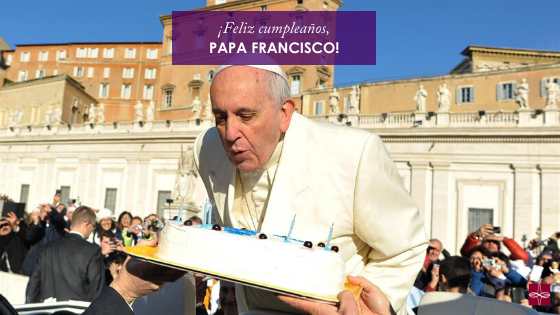

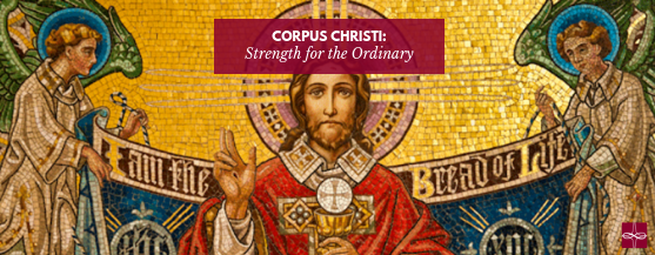

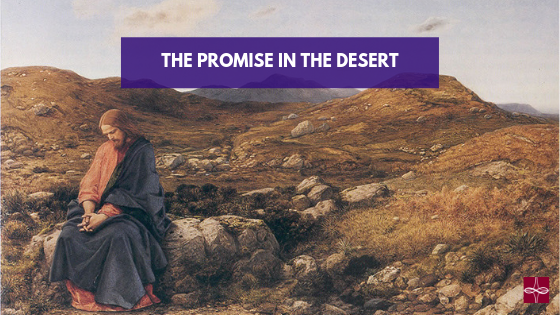



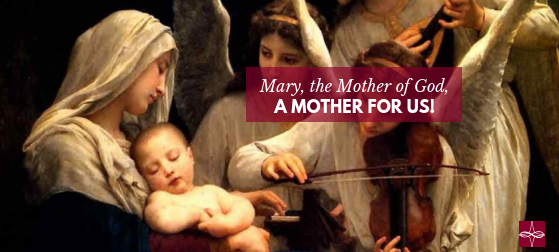

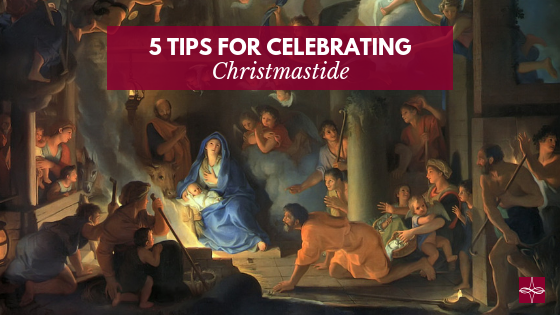

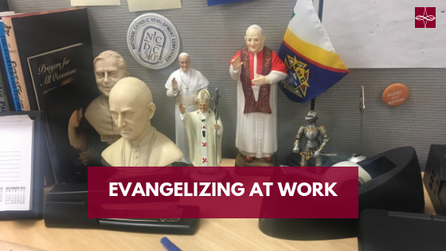

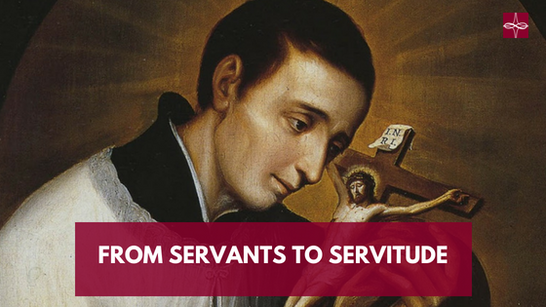

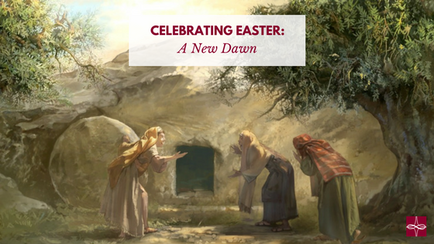





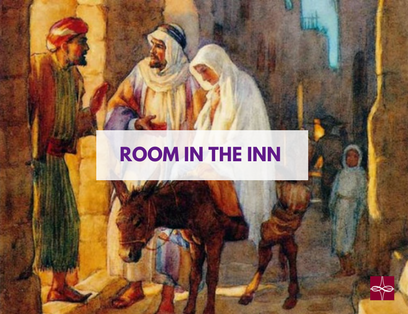

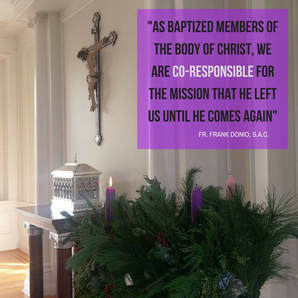
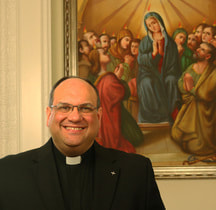
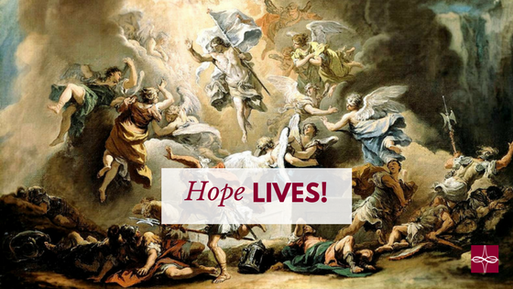
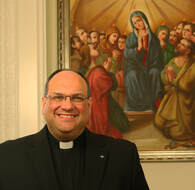
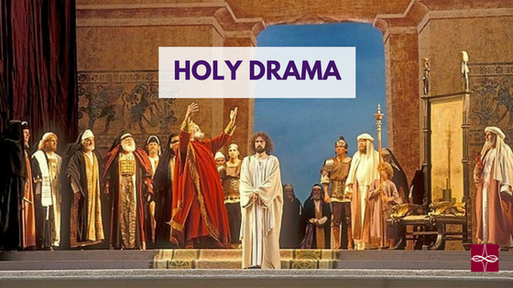

 RSS Feed
RSS Feed